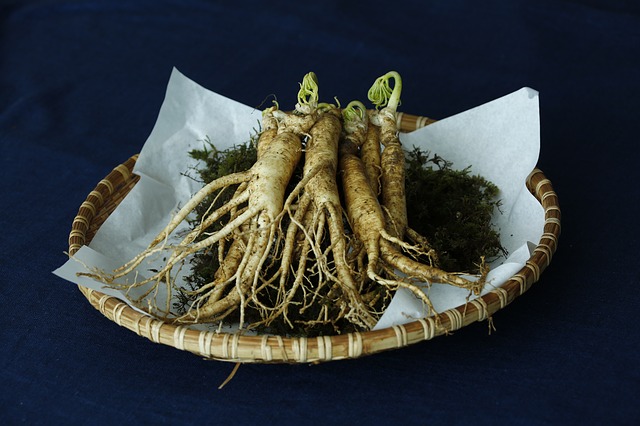Millions of people around the world consume kratom to cope with pain, anxiety, depression or to get a boost of energy. Kratom has also become a natural alternative to cope with the symptoms of opiate withdrawal. But although kratom is such a versatile substance, there are ways to enhance its benefits even more. Mixing kratom with other herbs, such as ginger or chamomile, may help you improve your kratom experience. In today’s article, we will discuss the benefits of mixing kratom and ginseng. What does ginseng do? And How can its effects enhance your kratom experience?
What Are the Effects of Kratom?
Kratom is a tropical tree in the Rubiaceae family native to Southeast Asia that grows in Indonesia, Thailand or Malaysia. Local farmers collect the best leaves from the kratom trees and dry them before turning them in a fine powder. The botanical name of kratom, Mitragyna speciosa, is related to kratom’s most abundant alkaloid: mitragynine. Mitragynine and other kratom alkaloids have anti-inflammatory effects. Furthermore, they are also agonists of the mu and delta receptors. The mu and delta receptors are part of your opioid system. This system gets that name because it comprises opioid receptors and even endogenous opioids that your own body produces.
By acting on the mu and delta receptors, kratom alkaloids help:
- Regulate and relieve pain
- Alleviate the symptoms of anxiety and depression
- Improve mood
- Increase energy
- Relax
- Fight insomnia
Also, the effects of kratom include analgesia, euphoria, relaxation, and stimulation. And kratom can help you improve focus and concentration. But could you enhance these effects by mixing kratom and ginseng?
What are the Effects of Ginseng?
The term ginseng refers to several plants in the Panax genus and even other plants that share similar properties. However, the most popular ginseng types are Asian ginseng (Panax ginseng) and American ginseng (Panax quinquefolius). Whilst both Asian and American ginseng share a lot of similarities, American ginseng is believed to be more relaxing. Also, ginseng usually refers only to the roots of these plants, which is the part that has more therapeutic properties.
The effects and benefits of ginseng include:
- Energizing effects
- Anti-inflammatory effects
- Cognitive improvement
- Relaxation
- Mood enhancement
- Antioxidant properties
- Aphrodisiac effects
- Immune system booster
- Lower blood sugar levels
- Anti-cancer properties
Thanks to all these properties, ginseng (in particular, Asian ginseng) has been one of the most common elements in Chinese medicine. And these effects are also the reason why ginseng is so popular all over the world. Furthermore, unlike kratom, ginseng is incredibly easy to find and has no legal restrictions. You can find ginseng in many formats, such as ginseng powder, capsules or even the whole root.
Benefits of Combining Kratom and Ginseng
The combination of kratom and ginseng may be very beneficial for many kratom users. On the one hand, ginseng can enhance some of the effects of kratom. On the other hand, users can also add up the benefits of ginseng to those of kratom. However, ginseng is not a potentiator. That is, kratom alkaloids will not stay longer in your body just for taking ginseng —which is what a real potentiator does.
What are the benefits of mixing kratom and ginseng?
- Get an energy boost more easily: Are you using kratom to fight fatigue and get a boost of energy? Thanks to the stimulating effects of ginseng, you may need a lower dosage of kratom to increase your energy levels. Furthermore, ginseng does not have jittery side effects.
- Enhance the relaxing effects of kratom: Since ginseng also has relaxing effects, by mixing kratom and ginger you may even feel more relaxed. Again, this means that you might even reduce your dose.
- Fight kratom libido loss: Many users complain that kratom causes libido loss. But the aphrodisiac properties of ginseng might beat this side effects.
- Reduce pain: Thanks to the anti-inflammatory effects of ginseng, the combination of ginseng and kratom could help you relieve pain even more effectively.
- Feel happier: Since ginseng also has mood-boosting properties, by adding it to your kratom routine, you might achieve euphoria more easily. Moreover, this combination might even be more potent when trying to relieve the symptoms of depression.
- Improve focus and concentration: Kratom can help you improve concentration and focus. But ginseng too. Hence, by combining these two products you may feel even more concentrated and improve focus.
Hence, by combining kratom and ginseng you may need lower dosages to achieve the effects that you are looking for. That also means that you might spend less money on kratom (and kratom is not a cheap product). Nevertheless, this combination may not be effective for everybody. And it also can have unpleasant side effects.
Side Effects of Kratom and Ginseng
Despite its benefits, both ginseng and side effects can have side effects. Therefore, you should be cautious when using any of these herbal remedies.
Ginseng could cause the following side effects:
- Insomnia and other sleep problems
- Increased heart rate
- Diarrhea
- Changes in blood pressure
- Breast pain
- Bleeding
- Dizziness
Also, ginseng could cause birth defects. Hence, it must be avoided during pregnancy and breastfeeding. Ginseng could also worsen the symptoms of autoimmune diseases, such as rheumatoid arthritis or multiple sclerosis. And since ginseng lowers blood sugar, it could interact with diabetes medication.
On the other hand, kratom also has side effects:
- Constipation
- Dehydration
- Nausea
- Drowsiness
- Dizziness
- Headaches
- Eye wobbles
Therefore, you should be careful when combining kratom and ginseng. But also, when you use each of these herbal remedies on their own. If you want to mix kratom and ginseng, it is recommendable to be very careful with the dose to avoid side effects. On the other hand, you should also make sure that neither ginseng or kratom will interact with any medication that you are currently using.


